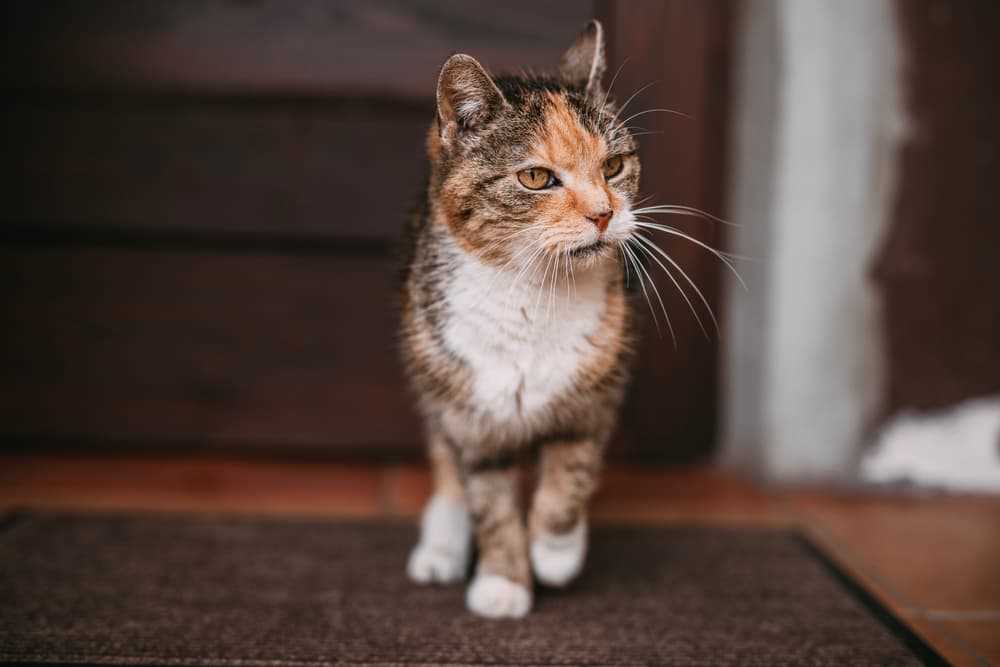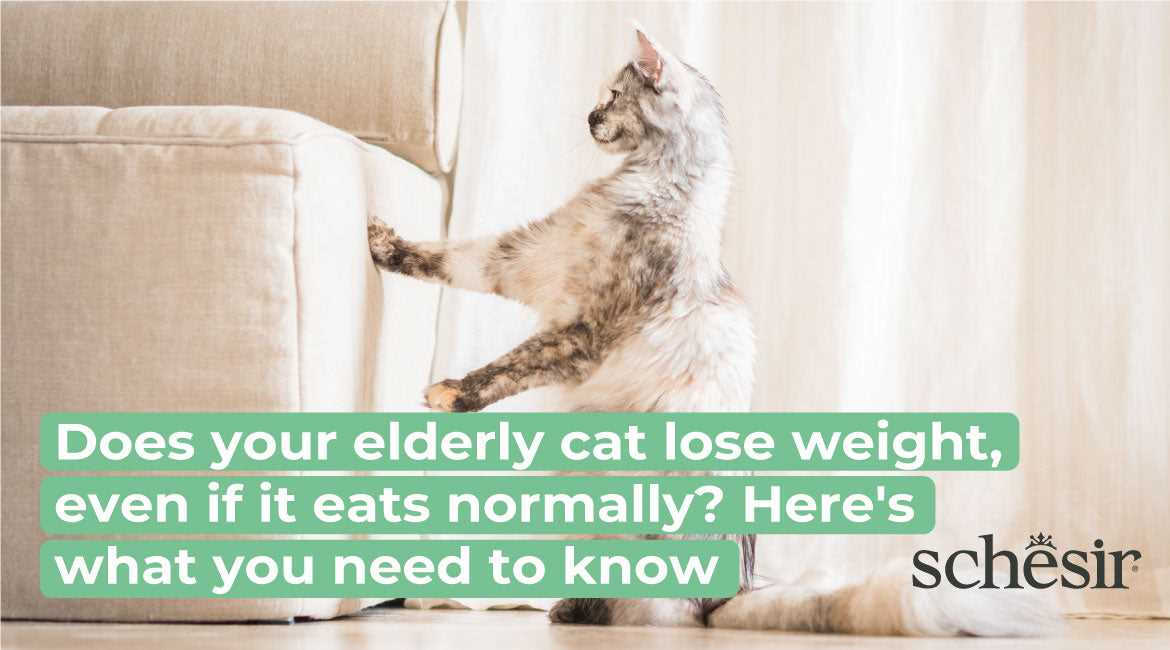

It’s a puzzling situation when I notice that my food bowl remains filled while my reflection in the mirror shows a slimmer figure. This can be alarming, and it’s essential to take immediate action. Regular veterinary check-ups are crucial for identifying any underlying health issues that may contribute to these unexpected changes in body condition.
Common health concerns like hyperthyroidism or diabetes can lead to increased appetite even as the body continues to lose mass. A thorough examination, including blood tests, can help pinpoint these conditions. If I notice frequent drinking or an unusual increase in my desire to snack, these could be red flags that warrant further investigation.
Switching to a high-quality diet specifically designed for mature felines can make a significant difference. Nutrient-rich, calorie-dense foods may help in maintaining my strength and overall health. Monitoring my food intake and ensuring I receive the right balance of proteins and fats is essential at this stage.
Regular exercise remains important. Engaging in gentle play can stimulate my appetite and help maintain muscle mass. Interactive toys and gentle games can keep me active without overexerting myself.
Paying attention to behavioral changes is equally important. If I seem lethargic or disinterested in activities I once enjoyed, it’s time to consult a vet. Keeping an eye on my habits will lead to timely interventions and a better quality of life.
Understanding the Common Causes of Weight Loss in Senior Cats
Experiencing a decline in mass while maintaining appetite can stem from various health conditions. Common issues include hyperthyroidism, diabetes, dental problems, and kidney disease. Regular veterinary check-ups are essential for early detection and management of these ailments.
Hyperthyroidism

This condition arises from an overproduction of thyroid hormones, leading to increased metabolism. Symptoms extend beyond mass reduction, often involving heightened thirst, frequent urination, and restlessness. Blood tests can confirm the diagnosis, and treatment options include medication, radioactive iodine therapy, or surgery.
Dental Issues
Oral health can significantly impact dietary habits. Painful gums or loose teeth may deter consumption despite a desire to eat. Regular dental examinations can help identify and address these concerns, ensuring comfort during meals.
Maintaining a close watch on changes in behavior and physical condition aids in recognizing potential health issues early on. Consulting with a veterinarian for tailored advice is always a wise choice.
How Medical Conditions Can Affect Appetite and Weight
Addressing health issues immediately can significantly influence consumption and body condition. Conditions such as hyperthyroidism, diabetes, and kidney disease can alter metabolic rates and nutrient absorption, leading to unexpected changes in body mass while maintaining normal or increased food intake.
Hyperthyroidism
This condition accelerates metabolism, causing excessive calorie burning. Despite an increased appetite, the body may not efficiently utilize the nutrients consumed, prompting noticeable decreases in body mass. Regular veterinary check-ups and blood tests can help identify this disorder early on.
Diabetes and Kidney Disease
Both diabetes and kidney ailments can lead to increased thirst and urination, which may result in nutrient loss. This can lead to a paradox where an individual appears to eat adequately yet continues to lose body condition. Monitoring water intake and changes in litter box habits can provide crucial information for your veterinarian.
For those looking to capture their furry friends’ moments, check out the best budget compact digital camera reviews for great options.
The Role of Dental Health in Weight Loss for Older Cats

Maintaining proper oral hygiene is critical. Issues like periodontal disease can lead to discomfort, making it difficult to eat properly. Regular dental check-ups can prevent these problems. If munching becomes painful, a beloved companion may start to avoid food.
Signs of dental issues include bad breath, swollen gums, and difficulty chewing. If any of these symptoms arise, it’s wise to consult a veterinarian immediately. They can recommend treatments or procedures to restore oral health.
Nutrition is also affected by oral health. A cat with healthy teeth can enjoy a varied diet, while one with dental problems might gravitate toward softer, less nutritious options. This change can lead to nutritional deficiencies, further exacerbating weight concerns.
Using the right dental care products can help maintain oral hygiene. Consider integrating dental products for cats into your routine for better health outcomes. Regular brushing and dental treats can make a significant difference.
In summary, oral health directly influences dietary choices and overall well-being. Regular monitoring and proactive dental care can prevent complications that affect appetite and nutrition.
Assessing Nutritional Needs and Diet Adjustments
Switching to a high-quality, protein-rich diet is crucial. Focus on options that contain real meat as the primary ingredient. This provides the necessary amino acids for maintaining muscle mass. Look for formulas specifically designed for older companions, as they often contain adjusted nutrient profiles.
Consider incorporating wet food into the menu. Moisture in canned offerings aids hydration and can stimulate appetite. Some companions may find these more palatable, making it easier to consume adequate calories.
Frequent, smaller meals throughout the day can help ensure proper nutrition intake. This approach may be beneficial for those who struggle with larger portions or have fluctuating appetites. Experiment with various textures and flavors to find what sparks interest.
Address any potential food sensitivities by gradually introducing new options. Monitor for any adverse reactions as you transition diets. If digestive issues arise, it may be worth consulting a veterinarian for tailored advice.
Supplements, such as omega-3 fatty acids, can support overall health and may aid in maintaining a healthy coat and skin. Always discuss with a professional before adding any new products to the diet.
Regular monitoring of body condition is necessary to track progress. Weighing regularly helps ensure that adjustments are effectively addressing nutritional needs. Keeping a food diary can also assist in identifying preferences and patterns.
When to Consult a Veterinarian About Weight Loss Concerns
If there’s a noticeable decrease in body mass despite a consistent appetite, it’s time to seek veterinary advice. Consider the following signs that warrant a visit:
- Sudden or significant changes in body condition.
- Behavioral shifts, such as lethargy or withdrawal.
- Vomiting or diarrhea occurring frequently.
- Signs of discomfort, such as vocalization or unusual postures.
- Changes in drinking habits, like increased or decreased thirst.
Regular health check-ups are critical, especially if there are existing medical issues. Monitoring body condition score is beneficial for tracking changes over time. If any unusual symptoms appear alongside changes in physique, a professional evaluation is advisable to rule out underlying conditions.
Routine dental examinations should not be overlooked, as oral health can significantly impact overall nutrition. If there are indications of dental disease, such as bad breath or difficulty chewing, consult a veterinarian for a thorough assessment.
In cases where dietary adjustments have been made recently, it’s wise to discuss these changes with a vet. Nutritional needs might shift with age or health status, and a professional can provide tailored recommendations.
Timing is key; don’t hesitate to reach out if there are any concerns regarding health. Early intervention can lead to better outcomes and improved quality of life.








